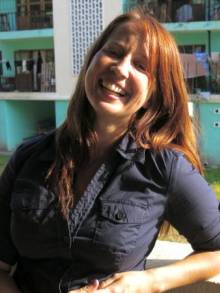Amy Faust
Master of Urban Planning
-
2011

How did your Wagner experience prepare you professionally for what you are doing today?
The theoretical and practical training from Wagner was key to advancing my previous position in international development and pivoting to deeper work on design and implementation of major urban infrastructure projects. My work requires a holistic approach and a firm grounding in understanding economic, political, technical and social angles to develop sustainable solutions with government and donor clients, all of which were embedded in Wagner’s core coursework and the urban planning program. On a practical side, Wagner demanded professionalism, solid communication and presentation skills, and an ability to consider and communicate across the many disciplines involved in urban policy and planning, all of which are critical for my work at both the policy and technical level in government and with my clients.
How did being in New York impact your professional journey?
Working as an urban development specialist in East African cities, I frequently draw from my experience in New York both in how I frame and approach urban challenges. In the Wagner MUP program we spent considerable time on the streets of New York, observing, sketching, speaking with people, in addition to learning the history of the city’s development and how current challenges are tackled. I now live and work in a rapidly developing city with myriad challenges of how sanitation, housing, transport, health services can keep up with population growth, and how an incredibly complex institutional and financial environment complicates development. This can be overwhelming at times for all of us working on these issues, but I draw from the lessons of New York when it too was a developing city and how the city was transformed through the power of planning, persistence, strong leadership, and an active civil society. I have shown images of the New York tenements to colleagues in the Tanzanian government to demonstrate that even New York faced similar challenges not that long ago – it is an inspiring message that resonates, and still inspires me as well that such dramatic changes is possible.
Describe your current job.
I currently have a freelance consulting practice working at the intersection of urban development and climate change resilience. At the moment my geographic focus is on cities in Mainland Tanzania and Zanzibar, but I aim to expand this scope to other countries and cities with flood vulnerability. As a consultant, my work varies widely from month to month and year to year. Right now my work is focused on two main areas: first, designing a 5-year program on building resilience to flooding in urban Tanzania, including preparation of a $30 million infrastructure project in Dar es Salaam that would tackle flooding in a complex and extremely degraded river catchment that bisects the city and improving emergency management systems in the city.
Second, I work closely with the World Bank and Zanzibar Municipal Council on implementation of an $85 million urban services project that includes drainage, solid waste management, cultural heritage investments, and a green corridor development. My day-to-day work includes project management to keep implementation on track, working with government, the World Bank and other stakeholders to design subprojects, and serve as a technical advisor on urban planning and environmental management issues.